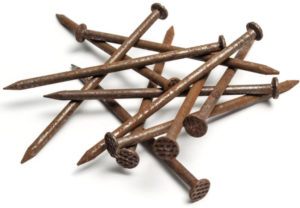RUST ≠ TETANUS
Contents
If you think rust causes Tetanus, then you’re wrong…
It’s been fed to our conscious that Rust=Tetanus. No wonder whenever we confront ourselves with rust, we think “I need to be careful, who wants a painful horrifying monstery injection”. Yep! You have guessed it right, I am no big fan of injections and I’m sure most of you aren’t too.
So what’s causing Tetanus? Should we be cautious of rust or not?
Well, it is definitely true that rust can be a reason for Tetanus but it certainly isn’t because of rust alone. Tetanus, also called Lockjaw, is a serious bacterial infection that affects the nervous system. It eventually causes muscles throughout the body to tighten. Tetanus is caused by a bacteria called Clostridium tetani, which makes its home in soil, dust and even in faeces. If you get a puncture wound from something that’s been exposed to either of the above-mentioned elements, regardless of whether it is rust or not, it’s possible to get infected with tetanus.

Clostridium Tetani Bacteria © Fine Art America
So why do you everybody makes a huge fuss about rusty nails can cause you tetanus?
The thinking is so because if the nail has been outside long enough to get rusty, then it’s probably been exposed to soils containing the bacteria. Rust also creates a new, rough texture on the surface of a nail which allows microscopic hidden caves for bacteria. Nails are a common avenue for infection because the tetanus bacteria advances in an oxygen-deprived setting. Still, every single injury that breaks through the skin including a pierce from a safety pin to even a minute dog bite, has a tendency to cause tetanus.

Rusty Nails © Cleveland Health Essentials
The disease’s effects can sometimes be fatal too. C. tetani releases a powerful neurotoxin called tetanospasmin that can cause muscle stiffness and convulsive spasms. It usually begins in the jaw thus the infection’s other name, “lockjaw.”
If you suspect you’re at risk for tetanus, it’s a good idea to see to a Doctor right away.
For more health-related posts, click here



1 Comment
John Gatesby · April 27, 2023 at 11:37 am
You have debunked a common misconception that rust alone causes tetanus. It’s important to be aware that tetanus is caused by a bacteria called Clostridium tetani, which can be found in soil, dust, and feces. Rust can provide a rough surface that bacteria can cling onto, but any puncture wound can lead to a tetanus infection.
John Gatesby recently posted…Dysautonomia POTS and Orthostatic hypotension